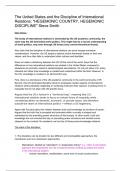The United States and the Discipline of International
Relations: "HEGEMONIC COUNTRY, HEGEMONIC
DISCIPLINE" Steve Smith
Main thesis:
The study of international relations is dominated by the US academic community, the
same way the US dominated world politics. This might lead to a narrow understanding
of world politics, only seen through US lenses (very narrow theoretical lenses).
Also claim that the discipline of international relations can never escape normative
considerations. However, the US adopts a rational choice framework based on their own
values, and thus often fails to understand other cultures and identities.
Does not make a dichotomy between the US VS the rest of the world. Says that the
differences in how international relations are studied in the United States compared to
elsewhere are primarily rooted in epistemological assumptions. It's not just about U.S. policy
interests but rather how knowledge is created and understood within the field. However, in
the US, knowledge is created in an ethnocentric way.
First, there is a dominance of the US academic community in the world community of IR.
Second, this US dominated discipline tends to emphasize certain aspects of international
relations while potentially neglecting or rendering irrelevant other aspects, including forms of
inequality that do not align with US specific focus.
Argues that the US is locked in a “territorial trap”, meaning that U.S.
international relations tends to focus on certain forms of inequality while
considering others as domestic, economic, or private issues, and therefore
outside the realm of international politics → reflects a US hegemony.
Agree with Foucault about the relation between truth and knowledge as functions of power.
Argues that the truth that is accepted and promoted within a society is shaped and
maintained by the prevailing power structures of that society. In other words, truth and
knowledge are not universal but rely on prevailing power structures and societal norms
(depend on the context). No academic can be free of these power-knowledge relations.
The state of the discipline:
1- The discipline can be divided into two different and incompatible approaches: the
mainstream and non mainstream approaches.
- Mainstream: labeled as “rationalism” or “explanatory theory” (i.e., refers to theoretical
approach that emphasizes the role of rational decision-making by states and actors
in the international system)
- Include neorealism, neoliberalism, some work of social constructivism.
, - Non-mainstream: labeled as “reflectivism” or constitutive theory” (i.e., emphasizes
the role of ideas, beliefs, and norms in shaping state behavior and international
relations. It suggests that states are not solely driven by material interests or power
calculations but are influenced by their perceptions, values, and the normative
context of international politics.)
- Include critical theory, postmodernism, feminist theory, postcolonial theory,
normative theory, peace studies, anthropological approaches and historical
sociology.
2- Neorealism VS neoliberalism
- Différences: in their views on the role of institutions in mitigating international
anarchy, and whether international actors pursue absolute or relative gains
- Neorealism (e.g., Waltz): skeptical about the ability of international institutions
to significantly mitigate international anarchy or change state behavior. +
states primarily pursue relative gain in the international system.
- Neoliberalism: thinks that international institutions can rpovide mechanisms to
manage international anarchy. + states pursue relative and absolute gains.
Can perform cooperation based on mutual gain to maximize their outcomes.
- Areas of agreements:
- Agreement on the core nature of international politics
- States = actors of IR
- States = rational and unitary
- States’ interests drive foreign policy behavior
Both tend to have a limited perspective on IR. Tend to exclude considerations of actors
beyond the state, issues beyond interstate war or economic cooperation, and interests and
identities that do not conform to the rationalist worldview.
Thus, the mainstream definition of international relations, characterized by its narrow focus
on state-centric and rationalist viewpoints, restricts the scope of the discipline and prevents it
from addressing broader and more diverse aspects of global politics and economics.
3-
Points out that epistemological assumptions (associated with positivism = naturalism i.e.,
applying methods of natural sciences to study IR) play a significant role in the rejection of
reflectivist scholars’ work.
Naturalism implies that “facts” are theory neutral and that normative commitments should not
influence knowledge. Knowledge is thus primarily derived from empirical observation and
data.
Most rationalists scholars do not explicitly state that their work is based on these
assumptions. While much of the U.S. literature in international relations may not be explicitly
rationalist, it operates within the framework of rationalism ontologically, adheres to
empiricism epistemologically, and employs positivist methodologies. These characteristics
collectively define what is considered "proper" social science in the discipline and serve as
the criteria for determining legitimate scholarship.




